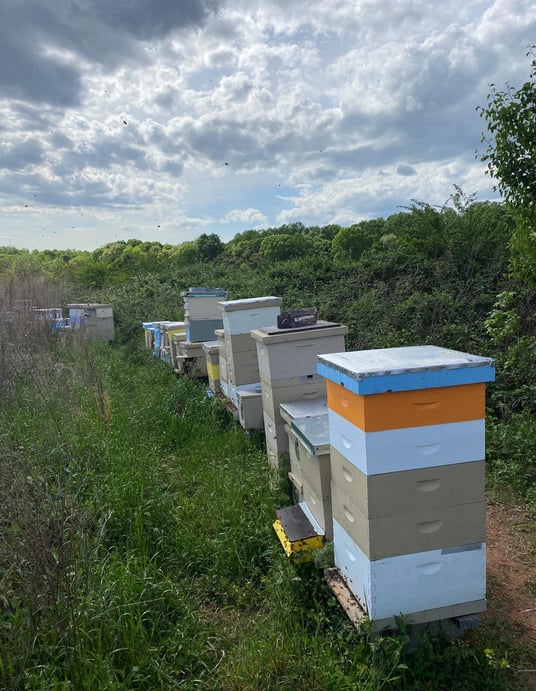Beekeeping Excellence
Passionate hobbyist producing queens, nucs, and honey with a focus on genetics and sustainability.
Passionate Beekeeping for a Sustainable Future
At Saluda Springs Bees, we specialize in queens, nucs, and honey, focusing on bee genetics and integrated pest management for healthy, resilient hives.


John Doe
"
My Journey in Beekeeping
I almost started beekeeping in Texas in 2012 when I operated a small vegetable CSA. My friend kept a few beehives on the plot where I grew food. When I took breaks, I would walk over to the hives and watch the bees flying to and fro. Fast forward to the Covid-19 lock down in Spring 2020 and my journey began. I decided to try bees after poor squash and cucumber pollination the previous season. Even though I read and watched videos, I kept(and keep) getting humbled by the bees. It takes "hive time" to really get a grasp on beekeeping. In July that year, I split the one nuc I bought in May. By October, I had harvested a few frames of honey and treated for varrroa mites. That Winter, I started building bottom boards, lids and plywood nucs and planning for next year. Both hives survived the deep freeze of 2021, and I attempted to split the hives before moving to Greenville, South Carolina in June. I packed the four hives(three queen-right) into the back of my SUV and drove all night with the help of a second driver.
From the beginning of my beekeeping journey I have been fascinated with bee genetics and queen rearing. My first attempt at grafting was in late July of 2021. There were a lot of duds, but some queen cells ripened and a few queens successfuly mated. With queen rearing, a table saw, and continuing enthusiasm, my colony numbers grew. By 2022, I found a new place to keep bees that allowed me to expand.
Honey bees face so many challenges, including lack of forage, pests, and pesticides. Beekeepers lost 55.1 percent of managed colonies in 2023-2024, according to preliminary results of the US Beekeepers Survey. Most entomologists point to varroa mites as the single biggest challenge bees face, but it's one that beekeepers can monitor and treat for. I monitor and manage varroa mites by treating with organic acids, using brood breaks and avoiding large colonies which can result in large mite populations. I purchase VSH (varroa sensitive hygiene) stock when bringing in new genetics. Bees advertised as VSH are not always truly hygienic though. I purchased a VSH breeder queen in 2024 and did not treat the colony when I treated the others. When I tested the breeder queen colony in late September, I sampled 33 mites! Fortunately, there are some VSH traits in the population of bees I manage. The main queen I breed from last year has not been treated in the last two years and has consistently had low mite numbers(0 to 1 in alcohol washes). I found a couple more hives last year that had low scores--2 and 1 respectively. Since they are also vigorous and produce honey, they will be breeding material for 2025. I cannot claim to be doing bee breeding since my queens are open-mated and I have a small number of hives. The nature of bee genetics means that there is so much genetic recombination that it takes a large population of bees to have a large enough selection pool. Also, if the drone populations are not controlled, progress is severely hampered since 50 percent of the genetic contribution comes from the drones. I rear queens grafted from my most productive and mite resistant queens each year or from tested VSH queens I purchase. Populations of varroa hygienic bees do exisit. VSH colonies can be identified by varrroa mite sampling and observation of brood cell uncapping behavior.
Currently a certified South Carolina beekeeper, I hope to reach the Journeyman level for the South Carolina Beekeeping Association in the next couple of years. I still consider myself a hobbyist with less than 50 colonies. I have sold a limited number of nucs and queens since 2023.


